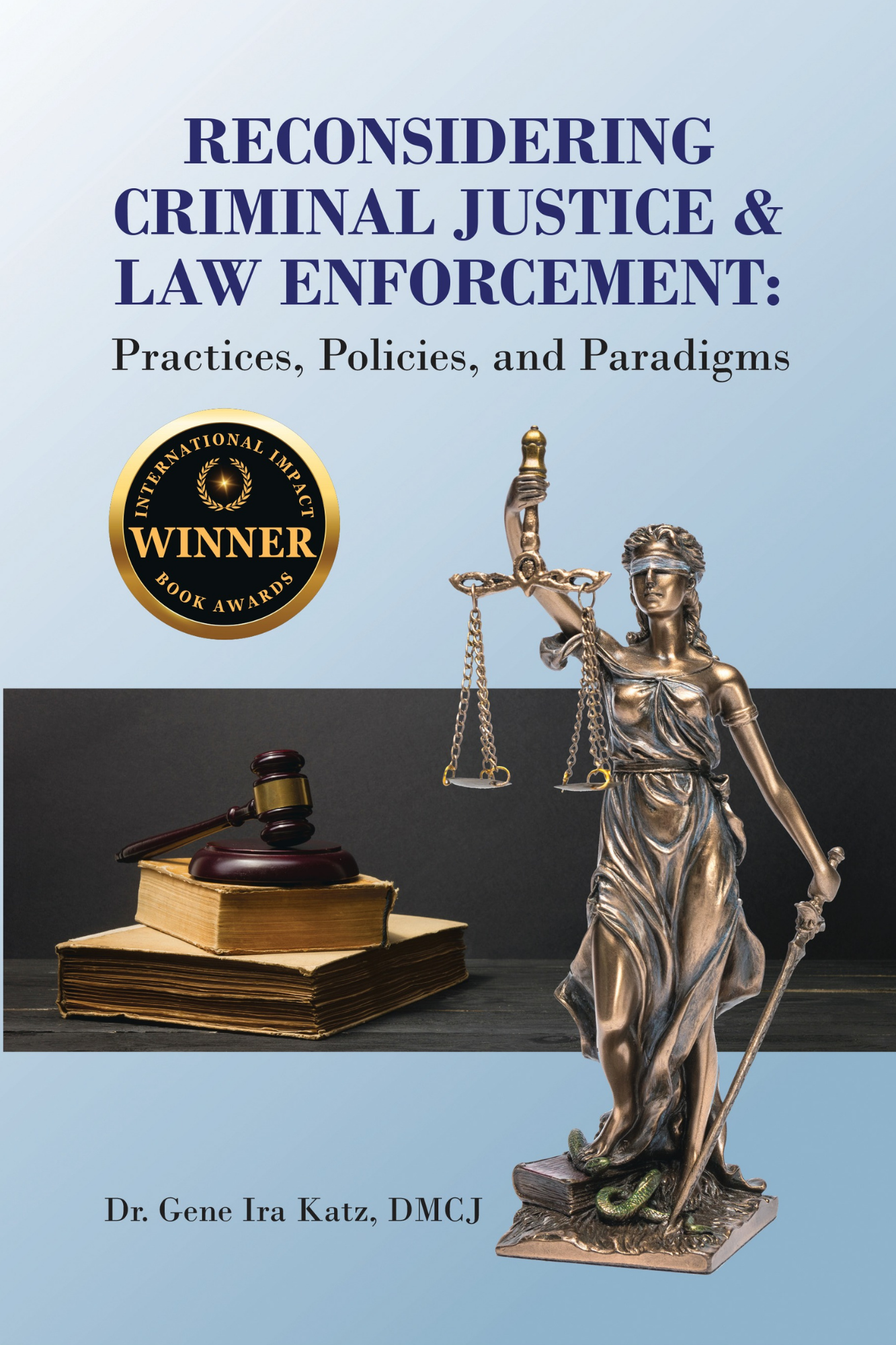Reconsidering Criminal Justice and Law Enforcement: Practices, Policies, and Paradigms
Author(s): Gene Ira Katz
Edition: 1
Copyright: 2024
Pages: 200
Edition: 1
Copyright: 2024
Pages: 156
$30.00 USD
Reconsidering Criminal Justice & Law Enforcement: Practices, Policies & Paradigms is a collection of evidence-based research offering a wide-ranging exploration of current and historical trends driving America’s predominant practices and policies in criminal justice and law enforcement, along with their cultural and legislative foundations. In addition to offering reasoned, practicable, and fair-minded options for addressing the legal system’s persistent struggles with fairness and equality, this book provides numerous proven solutions for significantly improving police-community relations and a variety of other positive outcomes.
For a better idea of the range of topics covered, here are some chapter titles, followed by a few select excerpts from the book:
- More Effective Police Community Relations Through Media, Personal Engagement, and Collaborative Events
- Law Enforcement Management Concepts for Enhancing Diversity
- The Expanding Militarization of US Law Enforcement
- Police Use of Force
- The Status of Women in American Policing
- Ethical Issues in Managing Law Enforcement Agencies
- More Effective Trends in Law Enforcement Training
- How Race, Social Class, or Common Stereotypes May Influence Officer Decision Making
- False Convictions in Death Penalty Cases
- The US and the International Criminal Court
- Legislative Responses to Sex Crimes
- How Race, Social Class, or Common Stereotypes May Influence Officer Decision Making
- Simple Self-Care Methods for Law Enforcement Personnel to Address Anxiety, Stress, Depression and PTSD
... and more
SELECTED EXCERPTS FROM THE BOOK:
Law enforcement agencies fulfill a fundamental role in our society, and in many communities, individual police officers are often the public face of local government. It is therefore critical that our nation's law enforcement agencies broadly reflect the diversity of the communities they serve.
<><><>
Over the past half-century, under the auspices of the federal government, most of the 15,000-plus police forces across the United States have increasingly acquired military-grade weaponry, equipment, and personal armor. In addition, especially following the terrorist attacks of 9/11, many of law enforcement agencies have embraced combat-style training, while also establishing specialized squads that enforce the law as though they were soldiers on an assault mission.
<><><>
Community Policing has been hailed as “democracy in action,” as it requires active sharing of responsibility through collaboration between local government, civic and business leaders...and everyone else who is concerned for safeguarding the welfare of the greater community.
<><><>
As with any organization, leaders in Law Enforcement Agencies (LEA) need to feel that they can rely upon the integrity and ethical behavior of their personnel. However, unlike most other organizations, the ramifications and repercussions of misbehavior among the ranks of LEA employees can have more serious, dire, and possibly even life-threatening consequences.
<><><>
As of 2021, 60.3 percent of full-time civilian employees in US law enforcement agencies were women, but only 13.3 percent of full-time law enforcement officers were women, whereas 86.7 percent of officers were male, and less than 3 percent of police chiefs were female... Statistics like these are cautionary warnings for leaders in law enforcement, especially for those who understand that local police should mirror the populations in which they serve.
<><><>
Fritsvold offers the elements that he believes are most essential for effective law enforcement leadership training. Topping the list are so-called “soft skills,” such as communication, team building, problem-solving, and conflict resolution.
The author is a frequent contributor to American Police Beat, the nation's most widely read law enforcement periodical. Here are links to a few of Dr. Katz's articles:
More Effective Police-Community Relations
The Evolving Legal Status of Marijuana in the U.S.
An Overview of Law Enforcement Training in The U.S.

A psychotherapist, educator, and author, who also holds a Doctor of Management degree in Criminal Justice, Gene Ira Katz has been an Associate Professor at Colorado Technical University's College of Criminal Justice & Health Services since 2011, covering numerous courses such as Criminal Profiling, Forensic Psychology, Victimology, Juvenile Delinquency, and more. He has also taught classes for the State Police Academy in Ft. Collins, CO.
An expert on sexually based offenses, Dr. Katz also created 'Sex Crimes: Behavior and Consequences,' one of the first university level courses of its kind in the US. In addition to being a Licensed Addiction Counselor and a Behavioral Health Agency-approved trainer for the Colorado School for Family Therapy, Dr. Katz is also an ABS board-certified Sex Therapist.
In addition to his private counseling practice, Dr. Katz has provided therapeutic interventions in jails/prisons, group homes, and forensic wards in psychiatric facilities, and he has been awarded citations from both the US Congress and the New York State Legislature for achievements in Community Mental Health.
With hundreds of published freelance articles to his name, Dr. Katz is also a regular contributor to American Police Beat, the most widely read periodical in the US on law enforcement. He has also written for Law Enforcement Today, the US-China Law Review, and is a frequent contributor to Behavioral Health News. He has written articles for AlterNET, CBS, AP, and numerous other outlets.
Dr. Katz is regularly invited as a speaker and presenter for professional conferences, including the Academy of Criminal Justice Sciences, the American Society of Criminology, the Illinois Assn of Chiefs of Police, the Mid-Atlantic States Correctional Assn, the CO Department of Corrections, the National Assn of Addiction Professionals, to name just a few.
Reconsidering Criminal Justice & Law Enforcement: Practices, Policies & Paradigms is a collection of evidence-based research offering a wide-ranging exploration of current and historical trends driving America’s predominant practices and policies in criminal justice and law enforcement, along with their cultural and legislative foundations. In addition to offering reasoned, practicable, and fair-minded options for addressing the legal system’s persistent struggles with fairness and equality, this book provides numerous proven solutions for significantly improving police-community relations and a variety of other positive outcomes.
For a better idea of the range of topics covered, here are some chapter titles, followed by a few select excerpts from the book:
- More Effective Police Community Relations Through Media, Personal Engagement, and Collaborative Events
- Law Enforcement Management Concepts for Enhancing Diversity
- The Expanding Militarization of US Law Enforcement
- Police Use of Force
- The Status of Women in American Policing
- Ethical Issues in Managing Law Enforcement Agencies
- More Effective Trends in Law Enforcement Training
- How Race, Social Class, or Common Stereotypes May Influence Officer Decision Making
- False Convictions in Death Penalty Cases
- The US and the International Criminal Court
- Legislative Responses to Sex Crimes
- How Race, Social Class, or Common Stereotypes May Influence Officer Decision Making
- Simple Self-Care Methods for Law Enforcement Personnel to Address Anxiety, Stress, Depression and PTSD
... and more
SELECTED EXCERPTS FROM THE BOOK:
Law enforcement agencies fulfill a fundamental role in our society, and in many communities, individual police officers are often the public face of local government. It is therefore critical that our nation's law enforcement agencies broadly reflect the diversity of the communities they serve.
<><><>
Over the past half-century, under the auspices of the federal government, most of the 15,000-plus police forces across the United States have increasingly acquired military-grade weaponry, equipment, and personal armor. In addition, especially following the terrorist attacks of 9/11, many of law enforcement agencies have embraced combat-style training, while also establishing specialized squads that enforce the law as though they were soldiers on an assault mission.
<><><>
Community Policing has been hailed as “democracy in action,” as it requires active sharing of responsibility through collaboration between local government, civic and business leaders...and everyone else who is concerned for safeguarding the welfare of the greater community.
<><><>
As with any organization, leaders in Law Enforcement Agencies (LEA) need to feel that they can rely upon the integrity and ethical behavior of their personnel. However, unlike most other organizations, the ramifications and repercussions of misbehavior among the ranks of LEA employees can have more serious, dire, and possibly even life-threatening consequences.
<><><>
As of 2021, 60.3 percent of full-time civilian employees in US law enforcement agencies were women, but only 13.3 percent of full-time law enforcement officers were women, whereas 86.7 percent of officers were male, and less than 3 percent of police chiefs were female... Statistics like these are cautionary warnings for leaders in law enforcement, especially for those who understand that local police should mirror the populations in which they serve.
<><><>
Fritsvold offers the elements that he believes are most essential for effective law enforcement leadership training. Topping the list are so-called “soft skills,” such as communication, team building, problem-solving, and conflict resolution.
The author is a frequent contributor to American Police Beat, the nation's most widely read law enforcement periodical. Here are links to a few of Dr. Katz's articles:
More Effective Police-Community Relations
The Evolving Legal Status of Marijuana in the U.S.
An Overview of Law Enforcement Training in The U.S.

A psychotherapist, educator, and author, who also holds a Doctor of Management degree in Criminal Justice, Gene Ira Katz has been an Associate Professor at Colorado Technical University's College of Criminal Justice & Health Services since 2011, covering numerous courses such as Criminal Profiling, Forensic Psychology, Victimology, Juvenile Delinquency, and more. He has also taught classes for the State Police Academy in Ft. Collins, CO.
An expert on sexually based offenses, Dr. Katz also created 'Sex Crimes: Behavior and Consequences,' one of the first university level courses of its kind in the US. In addition to being a Licensed Addiction Counselor and a Behavioral Health Agency-approved trainer for the Colorado School for Family Therapy, Dr. Katz is also an ABS board-certified Sex Therapist.
In addition to his private counseling practice, Dr. Katz has provided therapeutic interventions in jails/prisons, group homes, and forensic wards in psychiatric facilities, and he has been awarded citations from both the US Congress and the New York State Legislature for achievements in Community Mental Health.
With hundreds of published freelance articles to his name, Dr. Katz is also a regular contributor to American Police Beat, the most widely read periodical in the US on law enforcement. He has also written for Law Enforcement Today, the US-China Law Review, and is a frequent contributor to Behavioral Health News. He has written articles for AlterNET, CBS, AP, and numerous other outlets.
Dr. Katz is regularly invited as a speaker and presenter for professional conferences, including the Academy of Criminal Justice Sciences, the American Society of Criminology, the Illinois Assn of Chiefs of Police, the Mid-Atlantic States Correctional Assn, the CO Department of Corrections, the National Assn of Addiction Professionals, to name just a few.


